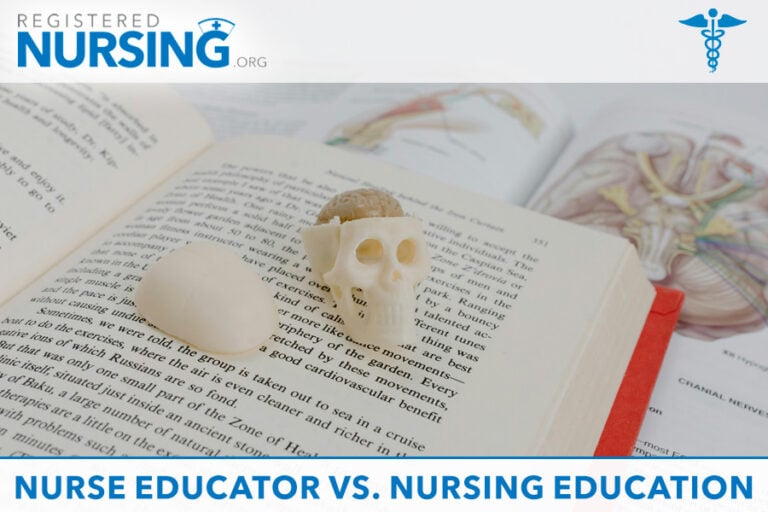Nurse Educator vs. Nursing Education: Understanding the Key Differences

The nursing profession offers numerous pathways for career advancement, but two commonly confused areas are “nurse educator” as a career role and “nursing education” as a field of study. While these terms are related, they represent distinct concepts with different educational requirements, career trajectories, and professional responsibilities. Understanding these differences is crucial for nurses considering advanced education or career transitions in academic or educational settings.
Nurse Educator Overview
A nurse educator is a registered nurse who has transitioned from clinical practice to teaching and educating future nurses or continuing the education of practicing healthcare professionals. These professionals work in various educational settings, including nursing schools, hospitals, healthcare systems, and community organizations. Nurse educators combine their clinical expertise with teaching skills to prepare the next generation of nurses and ensure current practitioners stay updated with evolving healthcare practices.
Nurse educators wear multiple hats in their professional roles. They develop curriculum, create lesson plans, teach in classroom and clinical settings, evaluate student performance, and often conduct research related to nursing education. Many nurse educators also maintain clinical competency by working part-time in healthcare settings or participating in continuing education programs to stay current with clinical practices.
Types of Nurse Educator Roles
Academic Nurse Educators work in colleges and universities, teaching in associate degree, bachelor’s degree, or graduate nursing programs. They typically hold faculty positions and may be involved in research, curriculum development, and academic administration.
Clinical Nurse Educators work in healthcare facilities, focusing on staff development, orientation programs, and continuing education for practicing nurses. They ensure that clinical staff maintains competency and stays updated with new procedures, technologies, and best practices.
Patient Education Specialists focus on educating patients and families about health conditions, treatments, and self-care strategies. They develop educational materials and programs to improve patient outcomes and satisfaction.
Nursing Education Overview
Nursing education refers to the formal academic programs and curricula designed to prepare individuals to become registered nurses or to advance the education of current nursing professionals. This encompasses the entire educational framework, including degree programs, certification courses, continuing education offerings, and professional development opportunities within the nursing field.
Nursing education includes various levels of academic preparation, from diploma programs to doctoral degrees. The field encompasses curriculum development, educational research, policy development, and the ongoing evolution of nursing pedagogy to meet changing healthcare needs and educational standards.
Components of Nursing Education
Pre-licensure Programs include diploma programs, associate degree in nursing (ADN), and bachelor of science in nursing (BSN) programs that prepare students to take the NCLEX-RN examination for initial nursing licensure.
Graduate Programs offer master’s degrees in nursing (MSN) and doctoral degrees (DNP or PhD) that prepare nurses for advanced practice roles, leadership positions, or specialized career paths.
Continuing Education encompasses ongoing professional development requirements, specialty certifications, and skills updates that practicing nurses need throughout their careers.
Specialty Education Programs focus on specific areas of nursing practice, such as critical care, oncology, or pediatrics, providing specialized knowledge and skills for particular patient populations or clinical settings.
Educational Requirements for Nurse Educators
Becoming a nurse educator requires specific educational preparation beyond basic nursing licensure. The level of education needed depends on the type of educator role and work setting.
Academic Nurse Educator Requirements
Master’s Degree in Nursing (MSN) is typically the minimum requirement for teaching in nursing programs. Many educators pursue MSN degrees with a focus on nursing education, which includes coursework in curriculum development, teaching methodologies, and educational assessment.
Doctoral Degree is increasingly preferred or required for full-time faculty positions, particularly in four-year universities. A Doctor of Nursing Practice (DNP) or PhD in Nursing provides advanced knowledge in research, leadership, and specialized practice areas.
Teaching Experience is highly valued, and many positions require previous clinical experience, often 2-5 years in relevant nursing practice areas.
Certification in Nursing Education through organizations like the National League for Nursing (NLN) can enhance credentials and demonstrate commitment to educational excellence.
Clinical Nurse Educator Requirements
Bachelor’s Degree in Nursing (BSN) is often the minimum requirement for clinical educator positions in healthcare facilities.
Master’s Degree is preferred for senior educator roles and provides advanced knowledge in adult learning principles, program development, and educational evaluation.
Clinical Expertise in the specific area of practice is essential, typically requiring 3-5 years of experience in the clinical setting where education will be provided.
Professional Certifications in relevant specialty areas demonstrate clinical competency and ongoing professional development.
Educational Pathways in Nursing Education
The field of nursing education itself offers various educational pathways for those interested in developing, researching, or administering nursing programs rather than teaching directly.
Curriculum Development Specialists
These professionals focus on designing and updating nursing curricula to meet accreditation standards and industry needs. They typically hold master’s or doctoral degrees in nursing education or related fields and have extensive experience in both clinical practice and educational settings.
Educational Researchers
Nursing education researchers conduct studies to improve teaching methods, student outcomes, and educational practices. They usually hold doctoral degrees and work in academic institutions or research organizations.
Program Administrators
Directors of nursing programs, deans of nursing schools, and other administrative roles require advanced degrees, typically at the doctoral level, along with significant experience in nursing education and leadership.
Career Opportunities and Salary Expectations
Nurse educators enjoy diverse career opportunities with competitive compensation. Academic nurse educators typically earn between $65,000 and $95,000 annually, with those holding doctoral degrees and senior positions earning significantly more. Clinical nurse educators in healthcare facilities often earn $70,000 to $100,000 annually, depending on the organization size and location.
The demand for qualified nurse educators continues to grow as nursing schools face faculty shortages and healthcare organizations prioritize staff development. This creates excellent job security and advancement opportunities for those pursuing nursing education careers.
Making the Right Choice
Choosing between becoming a nurse educator or pursuing other aspects of nursing education depends on your career goals, educational interests, and desired work environment. Nurse educators who enjoy direct interaction with students and clinical teaching may thrive in academic or clinical educator roles. Those interested in curriculum development, research, or program administration might prefer focusing on the broader field of nursing education.
Both paths offer rewarding careers that contribute significantly to the nursing profession’s future. Whether you choose to teach the next generation of nurses or shape how nursing education evolves, these career paths provide opportunities to make lasting impacts on healthcare quality and patient outcomes.
Latest Articles & Guides
One of the keys to success as a registered nurse is embracing lifelong learning. Our articles and guides address hot topics and current events in nursing, from education to career mobility and beyond. No matter where you are on your nursing journey, there’s an article to help you build your knowledge base.
Browse our latest articles, curated specifically for modern nurses.



